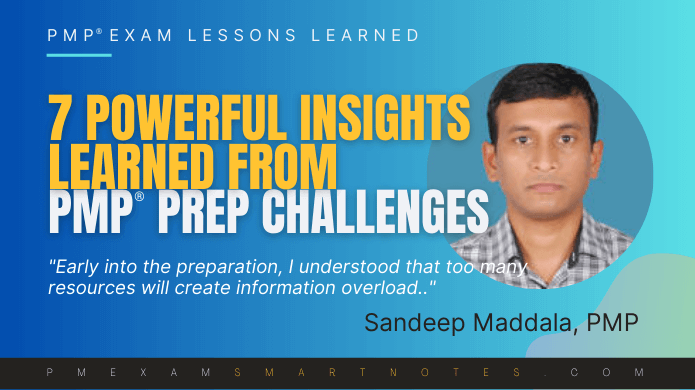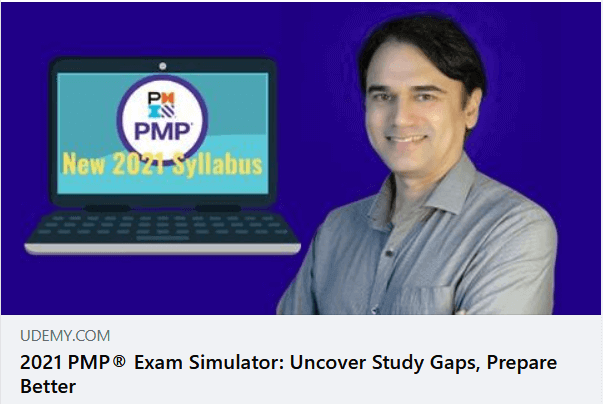 Sandeep Maddala is a project manager handling multiple projects in CAS, ISP VOIP, and IPTV domains. In this week’s PMP® lessons learned article, he shares how he prepared for his PMP exam, why he opted for the online test mode, and the insights he has gained along the way that could now help PMP aspirants.
Sandeep Maddala is a project manager handling multiple projects in CAS, ISP VOIP, and IPTV domains. In this week’s PMP® lessons learned article, he shares how he prepared for his PMP exam, why he opted for the online test mode, and the insights he has gained along the way that could now help PMP aspirants.
Sandeep faced quite a few challenges as a PMP student, and through some smart strategies, he managed to get over all of them.
What made you take up PMP®?

Of all the Project Management certifications I researched about, I found PMP® to be the best certification to get the required knowledge as well as recognition. Earlier I have done few technical certifications.
I discovered that PMP is much preferred compared to others because of the quality, depth of knowledge, benchmarking of candidates in the job market, and for the simple fact that this certification is comprehensive enough for project managers across all industries and domains.
The benefits of this certification started for me and my organization much before I passed it!
As I began to study I discovered many practices we were already using in day-to-day work and that the awareness of these processes, tools & techniques, and documents helped me improve upon the practices immediately.
Many think that PMP is only for those who wish to be in the management stream.
During my studies, I realized that this is not true and that PMP® can actually help people in technical roles as well (such as Technical architects, DBAs, QA leads, etc). It can help them streamline their work and carry out activities in an organized and planned manner, knowing how it impacts the overall management and delivery of the project.
Which study resources did you use for the exam preparation?
My mentor was “BPMP Certified” by Umakanth. I have gone through some online resources along the way to prepare, such as,
- PMBOK Guide,
- PM Exam Smartnotes blog (I enjoyed the topic wise charts and images with example-based explanation),
- Udemy course by Joseph Phillips, and
- a few YouTube channels (such as this one).
Early into the preparation, I understood that too many resources will create information overload. Thus I choose just a handful based on my research.
You may want to read:
- How Kalpana got all Above-Target scores on the second attempt
- [Download] Research-based plan to choose PMP study resources so you cut down as much as 50% of the effort
- PMBOK 7th edition released! Download primer guide here
How did you approach the exam, and what was your study plan?
Planning is important to be on track and make progress even when things do not go as per plan. I used one given by my mentor, and there are few available online.
No single plan works for all, so I made changes to suit my daily study schedule, planned breaks, and keeping work commitments in mind.
The second point is to not go for every study material we come across. Too many study resources could easily overwhelm.
Did you face any challenges along the way?
Yes, a few indeed.
1. Making time for study.
Soon enough I realized that miming to use only free time for PMP preparation is not a good plan. I got up at 4 am every day and dedicated few hours to the preparation.
2. Distraction by too many groups.
Listening to too many people pushed me off my study plan. Once I stopped this I was able to get back the focus. Just choose one or two groups to be part of – it actually gives you the push when needed, and maybe you get to help others with your insights as well.
3. Too many free mock tests.
If you run a google search for PMP simulators, you will find many free options. I quickly realized that not all free mocks are updated to the latest PMP exam version. Many questions from earlier PMBOK versions can easily mislead us (over many versions the names of processes, their knowledge areas, ITTOs have all changed).
It is best to invest in a good simulator instead. A good one can actually help learn as much as 40% of the edge content!
4. Going through the study material sequentially (chapter by chapter).
This may seem counter-intuitive but I found that after the first round of study going over sequentially can waste a lot of time.
Jumping between random topics and need-based study (after finding weak areas in mock tests) make the preparation interesting.
5. Sitting for 4 hrs can be tiresome.
It can be painful for sure. The only solution is to take plenty of dry runs. Practice mock tests for 4 hours, and practice various ways of managing time on the exam. So knowledge, patience, and concentration play an important role together.
6. Misunderstanding questions.
Unless we practice patience through 4 hours of the exam, we might tend to hurry. When this happens the first casualty is misunderstanding the question.
If a question is misunderstood, even answering the question correctly (in our opinion) results in an incorrect answer.
7. “You eat an elephant one bite at a time.”
As the proverb suggests, to avoid the mental weight of answering a large chunk of questions over 4 hours, I chose to treat it as a series of smaller tests!
The new exam now provides 2 breaks (more details here), so it would be similar to 3 tests of 60 questions each. The 10-minute break is optional, and taking it helps us recharge ourselves and move forward.
Even taking a 2-minute ‘deep-breathing break’ at the end of 30 questions would help.
Some might feel that taking a break will break the momentum, which might be true for them. So my suggestion is to validate our energy levels when the optional break is offered and make a choice of taking it or not.
In any case, practicing with full-length mock tests help us understand our energy patterns and go with a plan of whether or not to take the optional breaks.

The week before the exam is crucial. What was your approach to study during this week?
I chose to revise select few chapters and attempted mock tests.
2 days before I completely stopped taking mocks, to avoid strain my mind. Instead, I went through few topics and chose to review earlier mock test answers.
I also went over my brain dump (though there was no plan for using brain dump during the exam) but brain dump in mind for different topics, theories etc., at a high level.
What made you opt for the online PMP® test, considering the general hesitation around stricter rules?
Wherever we take the exam, we need to focus for 4+hrs and use the exam strategy as practiced.
I chose to take it from home because it gave me a way to align the exam slot to the time of the day of my choice. I am most fresh and active in the early morning hours, and with the online option, I could schedule a slot at 5:30 am.
As I had been studying in the early morning hours, taking the exam this early suited my concentration level.
The only fear I had was the possibility of internet connection disruption due to an unanticipated power outage. My laptop battery would last 4+ hours and for the Wifi router, I had UPS connected. Hence I was confident of taking the online exam option to my advantage.
Can you share your exam experience?
- One day before the exam I prepared the room by removing distractions, gadgets, and stationary. No clutter, sticky notes, calendars, clocks, or electronics.
- Then I ran the system-test application provided by PearsonVUE.
- As the exam started, I complied with the rules of snapping pictures of the room, photo Id, system check (webcam, mike, speakers, internet bandwidth), etc. Then I was good to go.
- I logged into the application 30 minutes before the scheduled exam time to do the check-in process and to get familiar with the UI (comments, highlighting, scratchboard, calculator, etc.,)
- I noticed that the timer counted down the minutes to zero.
- As the optional break was offered I chose not to take the break as I felt the need to carry forward the momentum.
- At some point in time, I was 10 questions behind the scheduled time. But then I was able to catch up on the lost time over the next several questions, few seconds per question.
- I had only a few minutes in the end, and I did not review the questions but instead double-checked whether I left any questions unanswered. I found one unanswered question and answered it.
Personally, I did not feel the exam was too tough although it touched so many topics.
The language and grammar used in the questions were good enough to understand and answer the question, but few questions were confusing, causing a dilemma. I did not spend too much time on them.
Any specific study tips for PMP® students?
I have already shared most of the tips or best practices. The one point I would like to highlight is that the perception of the complexity of the PMP exam might make us procrastinate, and we should guard against this.
Do not delay the exam too much.
It is best to have a timeline-bound study plan and push at it as hard as you can. There is no end to preparation and being 100% prepared is just not possible. Thus, gain the knowledge, judge exam readiness by attempting mocks, and then book the slot for the exam.
Choose your study materials, make a plan, stick to it as much as possible, and you will be able to do PMP under even 2 months.
I hope my exam experience would help you refine your preparation. Please do share with a friend you would liket to help.
I wish you all the best,
Sandeep Maddala, PMP
[SneakyAffiliate sneakyaffiliateurl=”http%3A//www.pmexamsmartnotes.com/recommends/pmprepcast” sneakyaffiliatecookiexpdays=”1″ sneakyaffiliatesplash=”Are%20you%20sure%20you%20want%20to%20leave%20before%20you%20checkout%20the%20most%20liked%20PMP%20training%20suite%3F” ] [/SneakyAffiliate]



